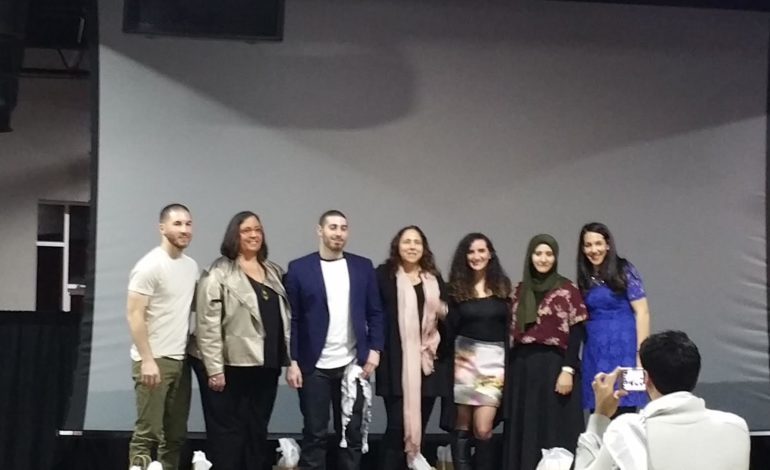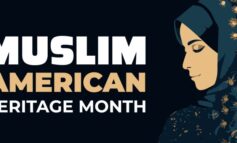DEARBORN—On Saturday, March 18, The Arab American National Museum held a storytelling event called “Hikayat: Personal Narratives from a Cultural Perspective” from 7 to 9 p.m. Some of the most successful and talented Arab Americans in the country shared their stories.
The Palestinians Podcast, a platform that aims to bring the Palestinian narrative to the forefront in Western media, partnered with the museum to present this special event.
The program invited storytellers Alise Alousi, Tariq Luthun and Hanan Yahya, with surprise guests State Rep. Abdullah Hammoud (D-Dearborn) and writers Kamelya Omayma Youssef and Annalise Raziq, all of diverse backgrounds.
The narrators had to tell their personal story without a paper on hand and did so generating waves of claps, laughs and cries.
Nadia Abuelezam, the creator of Palestinians Podcast and an assistant professor at Boston College, hosted the event.
Some of the most moving stories included Alise Alousi’s “Driving to Baghdad.” The Iraqi American writer and associate director of the Inside Out Literary Arts Project, who started off the event by narrating her story, said her parents decided to take their then four children on the ocean liner “Queen Elizabeth 2” from New York to France and to then drive their Chevy station wagon from there to Baghdad.
The second time they visited Iraq, 25 years later, they had no choice but to travel to Baghdad from Jordan by car because American citizens were not allowed to fly into Iraq.
“We [First generation Americans] love the place that our parents come from as if it was one yesterday removed from us,” Alousi said. “…I like to hang onto the belief, despite what my logical mind may tell me that someday I will return to Iraq. Maybe I’ll even come in a car. I know I’ll come bearing gifts, but I know I’ll leave having much more than I came with. It might not be tomorrow, but maybe the tomorrow after tomorrow.”
Palestinian American poet and strategist Tariq Luthun followed with a story about the power of sports called “HomeCourt.”
He had always felt that sports connected people. With that in mind, Luthun would play soccer with his cousins and even basketball with complete strangers every time he’d visit Gaza. He said it felt safe.
However, he said that after learning about the boys who were killed playing soccer on the beach in Gaza two summers ago and the February 2015 shooting death of Deah Barakat, who loved basketball, he realized when “violence wants to find someone it will.”
“But that doesn’t mean it has to stop us…” he said. “I do bring myself. I do bring my shoes. And I make a home wherever I stand.”
Hanan Yahya, a Yemeni American educator, entrepreneur, writer and artist, was the third to share her personal story. She took the audience with her to the city of Venice in her story “Depaysement (Disorientation).”
After a long train ride, she arrived in Venice, only to find, as she set out to explore the city, that all of her cards were being declined. She was also unable to withdraw money from an ATM.
After she spent hours in the rain looking for the train station, a Tunisian man named Imad assisted her. She found out he was disoriented himself as a deportee from Germany looking for jobs and sleeping on trains.
“Depaysement or disorientation is real,” she said. “It happens. It happens to the best of us and it happens a lot. The most important aspect is that people like Imad exist.”
After a 10 minute intermission, Abuelezam told a story of how her father stocked up on food due to concerns about the “Y2K bug” that was expected to implode computers in the year 2000.
Later, she realized he’d actually stocked up on food because he’d lived in a refugee camp during the Lebanese Civil War and that “food and security were an everyday issue.” He had to make sure to provide for his family as the eldest of four children, so his obsession with stocking food stemmed from that traumatic experience.
“We always have enough food,” she said. “We always have enough goods and we always have enough love. Just in case something was to happen. Just in case.”
Special guest Kamelya Omayma Youssef, a Detroit-based poet, teacher and student, ended her narration of her story “Finding the divine/Feminine in Dearborn” in awe of the city that she left again and again after feeling like the “other” as a non-practicing Muslim Arab with this quote: “I moved back to Dearborn, so that I can sit at Yasmine Bakery at six o’clock in the morning and listen to the sound of the Quran audio playing from the kitchen… And I realized that I’d never be at peace and at home unless I was first at peace at home.”
State Rep. Hammoud, a Lebanese American, told of his brother’s sudden death shortly before he started his campaign, but asked the audience not to videotape “The Mourning Campaign.”
“The night before the primary election, I drove to the cemetery,” Abdullah said in a tear-jerking moment. “…On my knees before my brother’s grave, I looked to the stars and I prayed to God to give me a sign… that Ali’s watching. When I uttered Ali’s name, I saw a shooting star… We won the next day and we won again in general elections.”
The final guest, Chicago-based Palestinian American storyteller Annalise Raziq, told her story, “Who knew?”, which focused on her late Muslim father and the rise of Islamophobia.
“When that first Muslim ban came through and I turned on the news hours later in Chicago, and there were hundreds and hundreds of people at the airport… I just stood in my living room and cried,” she said. “Because who knew?Who knew there were so many people who cared? I feel that good people are being called to action and so many people are answering that call. And that is something I wish my father could see.”






Leave a Reply